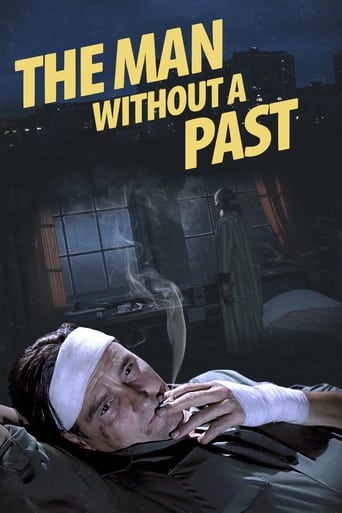Cinemucho
It's a slippery film, The Man Without a Past (original title Mies vailla menneisyyttä). Not quite film noir, not quite a parody of film noir, the movie tells the story of a man who is left penniless and clueless after a group of small-time thugs beat away his memory in the outskirts of Helsinki. This Oscar nominated film and winner of the Cannes Film Festival's Grand Prix is the second movie in writer-director Aki Kaurismaki's Finland trilogy. A comedy, noir, crime film, and satire, The Man draws on a variety of different genres but doesn't fully conform to any of them, thus maintaining a sense of self-consciousness that adds a dash of playfulness to the dry-as-bone dialogue.We know almost nothing about The Man (Markku Peltola) when he first appears to us disembarking a train with a single suitcase in hand, but that doesn't really matter. For one thing, neither does The Man, as the unfortunate mugging that leaves him stricken with amnesia quietly occurs within the first few minutes of the film. For another, The Man Without a Past is all about the indomitable will to keep moving forward. It's the present that matters most and what a triumph over present challenges means for the promise of a brighter future. The film emphasizes this theme even in the very beginning of, showing The Man living moment to moment as he wakes up from his brutal beating only to pass out again in a public bathroom. A custodian eyes The Man's bloody figure sprawled on the floor and says into his walkie, "We have a dead man here." But The Man lives, although only to be pronounced dead yet again in a hospital bed. When the defeated doctor and nurse leave his side, The Man simply opens his eyes as if waking from a brief siesta and takes off...only to pass out for the final time on the bank of a river. It is obvious that, even stripped of his most essential possessions like his health and a sense of identity, The Man will not give in to misfortune. Later on, after The Man's ingenuity and hard work has resulted in a small garden of potatoes, he makes sure to save a few for the winter. He explains to his friend, "We farmers must think of the coming years, too." While only a couple months earlier he was just a nameless nomad, The Man has turned himself into a farmer with prospects for the future.Fortunately, The Man's story doesn't end on the side of a riverbank. A family of four on the outskirts of Helsinki takes him in and nurses him back to health. He becomes well enough to start living on his own in the horrendously unkempt container shed rented to him at a high price by gruff security guard, Anttila (Sakari Kuosmanen). The Man swiftly cleans up the container to create cozy home and inserts himself into the quirky community of downtrodden outsiders that includes a love interest in the form of a lonely Salvation Army soldier, a Christian band that he turns into the hottest rhythm act in the area, a lawyer with a gigantic cigar, an adorable dog named Hannibal, and the most polite bank robber ever.Aside from the oddball characters and wacky situations that The Man finds himself, the comedy of this rather dark and subdued film comes the stylized acting and dialogue that draws on the cool personas seen in film noir and movies of the French New Wave. The Man and his lady love, Irma, (Kati Outinen) move with a stilted awkwardness and stare with blank expressions ever so slightly tinged with sadness. The characters speak in short, clipped banter that exemplifies the pinnacle of deadpan humor. For instance, while cooking dinner for Irma on a date at his place, an exchange between the pair goes as follows: Irma: The peas were fine.The Man: I went to the moon yesterday.Irma: Oh. I see. How was it? In Kaurismaki's world, everything is serious but not to be taken seriously.As the film goes on, the challenges The Man faces become less significant and ever the more ridiculous. Complications from The Man's past that initially seem major enough to separate he and Irma forever turn out to be laughably minor. Although The Man Without a Past is a film in which the emotional volume is turned down, it still delivers a happy, if not heartwarming, ending, thus further deviating from the film noir mold. There's a satisfying showdown with the criminals who beat up The Man in the beginning, but this time our protagonist has the whole town to back him up. This climax signifies The Man's triumph against all odds and the power of the marginalized when they stand together. Turning to The Man after scaring away his assailants, one of The Man's rescuers says, "So you decided to come back. The Man doesn't miss a beat, deadpanning "Obviously." At this point, we should expect nothing less from The Man Without a Past.
leftbreak
I sort of stumbled on this, actually was looking for more crime fiction movies, which this got put under somewhere. And yet, I quickly got engrossed in this movie. I think it was because it showed the joy of 'small things'. A man gets nothing in the beginning but hard luck, and yet, you see the joy and humor in his life, and in the lives around him. I immediately became a Aki Kaurismaki fan, and now can't get enough of him. But for anybody who has not seen this one, find the joy of independent film making once again.From his hotplate when cooking, to his relationship with his 'landlord' I kept finding the humor addictive, and even romance, which I'll not spoil, but just to say that love exists in poverty and despair kept giving way to music and the comfort of another human being. To think that just smoking a cigarette, one of the few small pleasures the poor had been left with during the depression, became heartwarming...
paldi
It is not typically easy for an American to make a comment on anything Finnish, and for this comment to possess any kind of depth or insight— the last time I can remember Finland coming up in anything remotely related to the American occident being accidentally nuked in an episode of the Simpsons. In many of the scenes of A Man Without a Past, it looks like Finland has been nuked, too. Or, at the very least, Helsignors, where the bulk of the movie takes place, looks to have taken a nasty beating. The movie follows the mysterious main character—only later named—through his adventures in Helsignors, which he arrives at by train at the very beginning of the movie. At the onset of his adventure, though, he suffers assault from three rascals who take all of his money and a deal of his possessions. They also take his memories, as he suffers memory loss. When the main character wakes up, he is washed up near a seaport, staring at two little boys whose family ends up taking him in for a while.Amnesia and memory loss are not in any way novel plot devices. In fact, they may be some of the most clichéd. What makes them fresh and interesting in A Man Without a Past is Aki Kaurismäki's method of storytelling. The audience experiences the main character's trials just as he does, as his life begins to unfold in Helsignors. The town feels as strange to him as it does the audience, creating a wonderfully convincing atmosphere, and adding to the general feeling of desultory drifting that pervades a good deal of the film. The main character is on a journey, but no-one, neither the character nor the audience, know where to. Another factor adding to the strange atmosphere is one of director Aki Kaurismäki's hallmark techniques: dialogue which is sparse, hypercorrect, and jarringly stilted. It is not that the acting is bad, or the delivery of the lines off. It is just the dialogue which is strange. Characters—even those whom are oddballs and would not necessarily speak like normal people—do not talk or interact in ways remotely organic. Often scenes are filled with awkward staring or looking away, the kind of gestures one would expect to see in soap operas, drama, plays, operas, or bad sitcoms—just not in a serious cinematic production. Though awkwardly reminiscent of 70s and 80s televisions programmes, the dialogue is also sometimes awkwardly charming. The interactions between the main character and his love interest are so infantile, banal, and earnest, it is easy to see why they could get together. The stiltedness of the dialogue is indicative of the overall style of the movie: it is minimalistic. It is not, however, focused or artistic in a sullen, European way. It is plainly simple. The plot is not meandering or plodding, but it develops at a measure pace. The movie is not long, clocking in at less than 90 minutes, so boredom and dragging are not likely to be any problem. The pacing of the plot is most appropriately described as life-like. Again, the movie is about the main character's (new) life eventually unfolding. He meets people, develops relationships, looks for a job, gets turned down at a government office, entertains dreams of becoming a rock'n'roll manager—a real life is made up of many little things, daily activities, and dreams. The main character himself is a minimalist and a realist, and it is his attitude (and his actor's portrayal) is one of the highlights of the movie. Again and again bad things happen to him. Despite whatever does befall him though, he remains constantly in relatively the same mood. Taking things in stride, he deals with the characters peopling his new life with a generally good nature, just as likely to banter with a drunk as he is with the pathetically corrupt policeman emptily threatens him. His interactions with these people leave one feeling light, happy, and amused, as well as frustrated when he lets himself be walked over without any truly heartfelt objection.Another highlight of this movie is the characters director Kaurismäki has come up with. Interesting, kitschy characters are practically a staple in his films, but the abundance of oddballs does not take detract from the delightfulness of a single one. In particular the formerly mentioned cop stood out. Typical of the corrupt cop archetype, he is "business minded", obviously operating against the law, taking bribes, and on and on. But he also has a ridiculously adorable dog named Hannibal, whom he feeds only raw meat and tries to threaten people with. He is so covered in keys, key rings, and pairs of handcuffs, that when he walks he sounds like a child shaking a piggy-bank full of pennies and nickels. But he is not a bad man, and he seems to get along just fine with the main character, even though he constantly is swindling the main character. There is also in this movie a kind of obtuse criticism of the welfare state, society, Salvation Army, and the whole lot, though it is not so biting that it either a) takes itself too seriously, or b) detracts from the overall movie. Rather, the system to help the downtrodden is portrayed in a way such that it is just another part of an absurd life. It is not an answer to the main character's problems, nor particularly helpful to anyone who does not have a name. The Salvation Army, as secular as it behaves despite the myriad of Jesus paintings hanging around, is infinitely more helpful than the Finnish state. As for the system overall, though, Irma sums it up eloquently when she tells the main character, "God's mercy reigns in heaven, but here on earth one must help himself."



